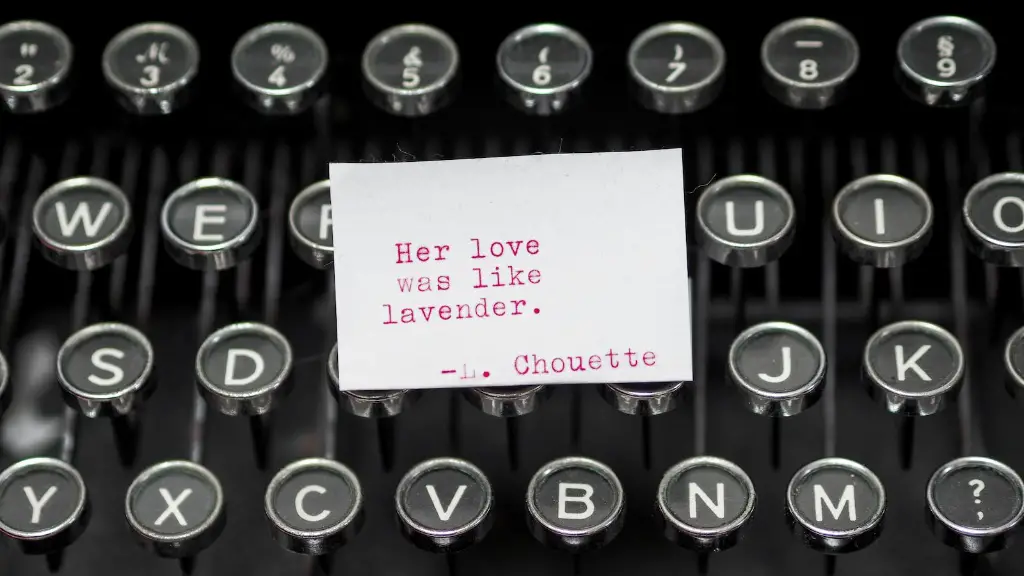Origin of Poetry
Poetry is an age-old literary art form that has been around since ancient times. It has been used to express emotions, tell stories, express opinion, teach, and much more. Poetry has been used in many different cultures and countries around the world, from the ancient Mesopotamians to the present-day poets. It has been around for millennia and continues to be popular today.
Poetry is typically thought of as a form of writing that rhymes, but this is not always the case. Many poems have very little rhyme or none at all, as the focus of the poem is usually on the story or meaning behind the words. It is possible to create beautiful and meaningful poems without the need for rhyme.
Creating Meaningful Stories
When creating a poem without rhyme, the writer should focus more on the content and story than the rhythm and structure. Rather than rhyming, the poet should focus on creating meaningful and engaging stories. Stories that are threaded together with powerful and emotional images create poems that are more powerful and memorable than ones that merely rhyme.
The poet should aim to tell a story that packs an emotional punch, as this will likely capture the attention of the reader. While rhyme can often add interest to a poem, it is not essential for creating a great poem. In fact, there is some evidence that suggests that rhyme can actually impede ones ability to create a powerful and meaningful poem.
Versatility of Language
One of the great advantages of writing poetry without rhyme is that it allows writers to explore the versatility of language. By experimenting with different words, tones, and structures, poets are free to express themselves in creative and unique ways.
The playful use of language can result in a poem that is both powerful and emotive. By using descriptive language, allusions, and metaphors, poets are given the freedom to create new and interesting ways to say the same thing. This can create a poem that is both memorable and evocative.
Finding Inspiration
When writing without rhyme, the poet should not be afraid to look outside of their immediate environment for inspiration. Nature is a great source of inspiration, with trees, rivers, and mountains frequently providing powerful sources of inspiration. Places and people can also be great sources of inspiration, as they can help to bring a unique perspective to the poem.
No matter where one looks for inspiration, it is important to look for it with an open mind. Often, the best ideas come from unexpected places, so poets should be open to new and interesting sources of inspiration.
Advanced Grammar Structures
Writing poetry without rhyme allows for the exploration of advanced grammar structures. By experimenting with different types of sentence structures, poets are free to create unique and interesting poetry.
For example, writers may use run-on sentences, inversions, or conditional phrases to add to the complexity and emotion of a poem. Understanding and using these more advanced structures can give greater depth and meaning to a poem.
Using Emotion to Connect
Using emotion is an important part of writing powerful poems. Whether it is joy, sadness, anger, or any other emotion, writers should strive to evoke it in their poetry.
To do this, writers should think of poetry as a means of connecting with readers on an emotional level. Rather than relying heavily on a use of rhymes, writers should focus on using words that evoke the desired emotion. Words that powerfully display the emotion of the poem can help to create an emotional connection with readers.
Using the Active Voice
When writing a poem without rhymes, words should be chosen carefully. The poet should strive to use the active voice rather than the passive voice, as the active voice helps to bring the poem to life.
The active voice is useful for writing powerful and emotive poetry as it helps to convey the intensity of the emotion more clearly. It can also help the reader to connect with the poem more easily, as there is a clear sense of intention in each word.
Writing Meaningful Poetry without Rhyme
Writing meaningful poetry without rhyme is possible. By focusing on content, story structure, language, emotion and voice, poets can create meaningful and powerful poems that can emotionally connect with readers. Poetry without rhyme can be used to tell stories, express opinion, and experiment with language in creative ways. It is an art form that can be used to create powerful and emotive poems that pack an emotional punch.
Develop Your Writing Style
Writing poetry without rhymes allows for the exploration of different writing styles. By experimenting with different techniques, poets can find the writing style that is most suitable for them.
For example, a poet may find that they prefer to write using more poetic language, while another may prefer vivid descriptions. Regardless of their preferred style, poets should experiment with different words, structures, and phrases to find the style that works best for them.
Editing and Revising Poetry
When writing poetry without rhyme, it is important to go back and edit and revise the poem. Though the poem may be finished at first, it is important to review the poem and make any changes necessary to make the poem better.
Going through and editing a poem can help to ensure that the poem is the best version that it can be. This can include tweaking the language, revising the structure of the poem, and even making changes to the story. By continuously making small changes, poets can ensure that their poem is the absolute best version of itself.
Getting Feedback
Finally, it is important for poets to get feedback on their poem from other people. This can help them identify any mistakes or changes that can be made to the poem. It can also help to provide fresh perspective on the poem, as people may identify things that the poet may have missed.
Having a fresh set of eyes on a poem can be incredibly helpful. It can not only help to provide feedback on the poem, but it can provide encouragement and offer insight into different writing techniques. Ultimately, getting feedback can be incredibly helpful in ensuring that the poem is the best that it can be.


